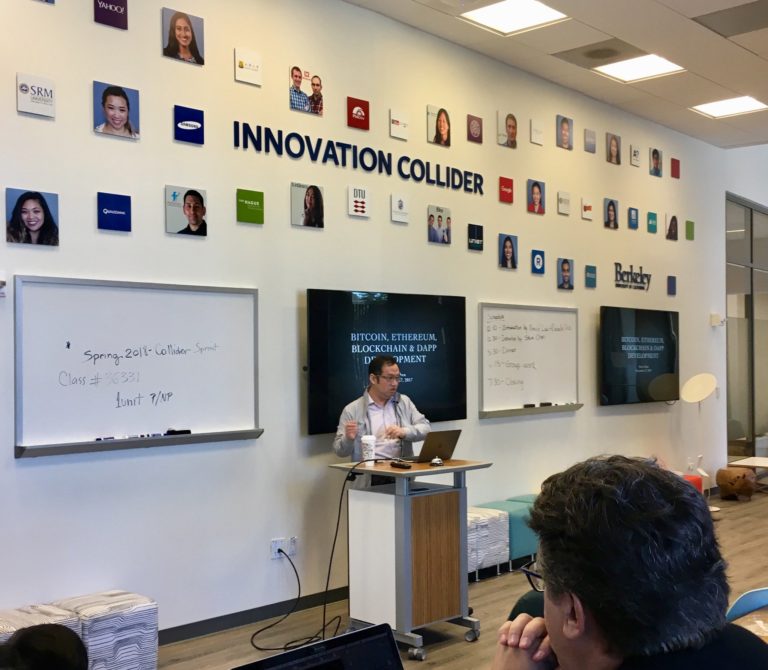Steve Chen, founder of EchoLink, a credentials-verification blockchain project, has been appointed industry co-lead of the new Berkeley Blockchain Lab, a platform for students to gain real-world experience working with blockchain technology at the University of California, Berkeley.
The Berkeley Blockchain Lab is an initiative of the Sutardja Center for Entrepreneurship & Technology, which has been experimenting with blockchain programming for several years. The SCET launched its first blockchain course, the Blockchain Technology Collider, in March 2016, enabling undergraduate and graduate students from across the Berkeley campus in areas such as engineering, finance, economics, and mathematics to come together to explore emerging opportunities in blockchain at the intersection of finance, security and cryptography.
With the success of the initial collider and momentum in the area, the SCET launched the Berkeley Blockchain Lab this fall 2017. The lab allows students to work on real-world blockchain projects, take courses on blockchain technology, and conduct research in the rapidly-evolving field. Courses offered in the lab will also provide Berkeley students with credit toward the five required to earn the Certificate in Entrepreneurship & Technology.
EchoLink recently became the lab’s first supporter and partner with its first-of-its-kind Bitcoin donation to the blockchain lab. EchoLink seeks to create its own utility token, the EchoLink token (EKO), to establish an international education reputation and skill-level marketplace.
 Steve Chen recently held a workshop at the Sutardja Center to help students learn the basic of blockchain development on the Ethereum platform.
Steve Chen recently held a workshop at the Sutardja Center to help students learn the basic of blockchain development on the Ethereum platform.
“UC Berkeley is an ideal first pilot educational institution because of its active student blockchain enthusiast community,” says Chen. “With Berkeley’s reputation for strong economics and computer science programs, combined with its culture of student activism forged in the 1960s, the school is well-positioned culturally to take advantage of the focus on decentralization and the elimination of ‘middlemen’ and central authorities that blockchain startups often promote.”
The student blockchain community is strong at Berkeley. In 2016, Tobias Disse, a student from The Hague in the Netherlands, came to Berkeley as an exchange student through the SCET’s Global Partners Program. Disse, along with Berkeley students and other exchange students in the program, created Blockchain at Berkeley, a student group, which among other activities, helped support UC Berkeley’s initial two-unit “DeCal” blockchain course. This fall, the student group also organized a large blockchain conference, and just recently organized a conversation with SEC regulators on campus.
The Blockchain at Berkeley student organization has 567 members in its Facebook group and also has Meetup and Slack channels that are extremely active. The student leaders of Blockchain at Berkeley come from diverse professional experiences including serving as analysts of investment banks and software engineers at local tech startups. Collin Chin, UC Berkeley ’19 a current electrical engineering and computer sciences junior, was able to secure an internship at leading blockchain startup Consensys as a software engineering intern the summer of 2017 after getting his first taste of developing use cases for blockchain as a developer at Blockchain at Berkeley in the Fall of 2016. Collin now serves on the Executive Board at Blockchain at Berkeley and handles recruiting of members and execution of events. Max Fang, President at Blockchain at Berkeley, also involved with the DeCal course, also spent his previous summer as a Developer Advocate Intern at Lightning Labs in SF and is a double major in computer science and economics.
EchoLink is building a blockchain-based system that provides verified education, skill, and work experience information. Taking advantage of blockchain technology’s immutability and time-stamp functionality, EchoLink provides users with trusted information regarding a job candidate’s education, skill, and work experience. EchoLink provides savings to recruiters in time and financial resources. The EchoLink system can be also be used for additional industries, such as banking, finance, general notary service.
Chen came up with the idea behind EchoLink while serving as the founding engineering director at a NYSE mobile technology company, where he saw the opportunity to create efficiency and value by storing data around engineering graduates’ degrees on the blockchain. Chen hopes to have the first batch of credentials stored on the platform by Spring 2018. With students opting in and registrars providing verified information, the information will then be accessible to recruiting partners and will save recruiters looking to hire top talent both time and financial resources. To get involved as an educational institution seeking to pilot the EchoLink technology, please reach out to Steven Chen at steve@echolink.tech.
The SCET has helped create the foundation of Berkeley’s entrepreneurship ecosystem by launching institutions and programs such as SkyDeck, the Fung Institute for Engineering Leadership, the Engineering Leadership Professional Program, Global Venture Lab, and cultivating an extensive network of Silicon Valley and global partners. The Berkeley Blockchain Lab will sponsor projects for students and faculty though an open a call in January 2018. If you’d like more information on sponsoring activities at the Blockchain Lab, please visit here or contact Jocelyn Weber at jweberphipps@berkeley.edu.
